Four woman-backed nonprofits are lending a helping hand to those most in need in the Austin community.
By Shelley Seale, Photos courtesy of Truth Be Told, Freehand Arts Project, Austin Angels and David Carrales
 Melissa first saw adult life on the outside of prison walls in June 2015. She was behind bars for 15 years, having been convicted as a teenager and sent to prison by the time she was 21. She basically grew up imprisoned. When she was released into society, she had never used a cellphone, had a driver’s license or rented an apartment.
Melissa first saw adult life on the outside of prison walls in June 2015. She was behind bars for 15 years, having been convicted as a teenager and sent to prison by the time she was 21. She basically grew up imprisoned. When she was released into society, she had never used a cellphone, had a driver’s license or rented an apartment.
Despite the odds, Melissa created a happy new life for herself. With patience and maturity, she built healthy relationships with her two teenage children, who had been infants when she went to prison, and is now thriving in a managerial job in the hospitality field, overseeing a small staff and a departmental budget.
Melissa largely credits her success to a program she participated in while incarcerated. Truth Be Told, a local nonprofit service organization, provides the transformational programs that encourage community building, communication skills, creativity and self-care for women behind and beyond prison walls.
“Truth Be Told is a no-nonsense, open, loving, forgiving place to breathe again, and I honor the program and I owe my life to the volunteers,” Melissa says. “Through all of my searching and longing, through my walk with God, through my education and my family and friends, this class, by far, touched me and opened my soul and allowed me to heal myself, to be my own friend, to love myself, to be free of the pain and burdens that had held me down for so long. The resentment and the betrayals, I finally could let them go. I still, to this day, use this experience as a joy and a lifesaver.”
Truth Be Told is one of several woman-backed organizations carrying out truly life-transforming work through one unifying mission: to lend a helping hand to an overlooked portion of the population.
Truth Be Told

Melissa was a class member of Truth Be Told’s program called Talk to Me, a 16-week series that focuses on helping female inmates get in touch with their feelings and own their stories, and encourages sharing those stories with others through expressive writing, expressive movement and public speaking. These classes, like the others offered by Truth Be Told, are meant to build a safe and healing community.
Executive Director Katie Ford says Melissa effectively utilized the self-care, communication and community-building skills she learned through Truth Be Told to create a flourishing life after prison.
“I’ve witnessed over and over again the transformation that takes place when a woman discovers her personal worth,” Ford says. “When a woman understands her worth, her whole world changes—because she has changed.”
Ford, who comes from a journalism background, says she wasn’t traditionally groomed to be the executive director of a nonprofit. However, she realizes “her gifts as a storyteller and a communicator” are exactly what she needed to inspire people to become change-makers for justice-involved women.
Ford initially became involved in the organization when she agreed to be a “respectful witness” at a Truth Be Told program graduation inside Lockhart Correctional Facility.
“It was life-changing in that it opened my eyes to a population I’d never considered before,” she recalls, noting she was moved to become a volunteer facilitator for the Talk to Me course. “It only took a semester of listening to the women’s stories to hear the common narrative thread of abuse, addiction and incarceration. Once I was awake to this reality, I couldn’t go back to sleep, so to speak. I knew that empowering women to change this imprisoning narrative would be my life’s work.”
For the incarcerated women served by Truth Be Told programs, a key aspect comes in breaking these cycles of abuse and addressing the unique risk factors that lead women into the criminal-justice system, namely elevated rates of interpersonal violence, controlled-substance abuse and histories of childhood sexual and physical abuse. Studies show about 75 percent of incarcerated women were abused as children. But after listening to the stories of incarcerated women for almost nine years, Ford estimates that figure is closer to 95 percent.
“Truth Be Told addresses a documented service gap in the correctional system for gender-responsive programs, or programs designed by women for women,” Ford says. “The correctional system was designed mostly with men in mind. We incarcerate about 2.3 million people in the United States, and women only make up about 220,000 of that population. However, women are getting incarcerated at nearly twice the rate of men. The number of women under custody has skyrocketed 834 percent since 1978.”
Empowering these women on a path to healing their trauma has a ripple effect for the next generation because seven of 10 women served by Truth Be Told are mothers. And when a child has an incarcerated parent, the likelihood of that child being incarcerated in his or her lifetime escalates to 70 percent, according to the Texas Department of Criminal Justice.
“Trauma not transformed is trauma transferred,” Ford says. “When you empower a woman, you empower a community.”
She saw this come full circle when she accompanied Melissa back into Lockhart Correctional to speak to Talk to Me graduates as a free woman.
“It was amazing to experience this moment with Melissa, she and I entering and leaving the prison together as free citizens, volunteering our time to uplift the women inside,” Ford says. “Who better to speak on the need for gender-responsive programs and policies in women’s facilities than the women who have been impacted by the system? It was so powerful for our graduates to see one of their own in a leadership role and achieving a milestone in her life. We want them to realize that their stories—their voices—continue to matter out here in the free world.
Freehand Arts Project
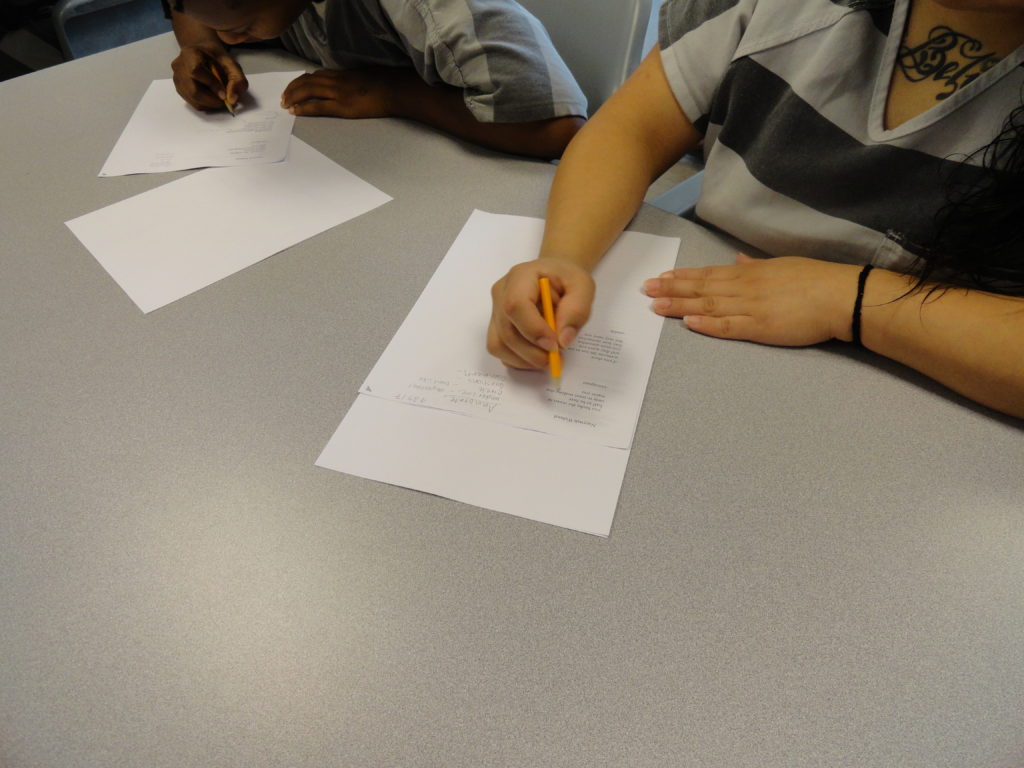
This is another nonprofit organization dedicated to bringing the creative arts to people incarcerated in Texas jails and prisons. Freehand Arts Project seeks out and trains highly qualified teaching artists to hold weekly or biweekly creative-writing and visual-arts classes inside correctional facilities, where students are encouraged to express themselves by creating stories, poems and visual art among a safe community.
Kelsey Shipman founded Freehand Arts Project in 2014 after she spent time volunteering at the Travis County Correctional Complex teaching poetry. A poet since childhood, Shipman was inspired by some of her favorite writers who had worked inside jails, and longed to share the power of the written word with people incarcerated locally.
“Though I was working alone, there was so much interest from inmates that I decided to reach out to some friends to see if they wanted to teach with me,” Shipman recalls. “After a few years, interest snowballed and the organization grew. I realized that it was important to serve as a supportive bridge between the jail and our volunteers in order for our programming to be successful.”
Unlike Truth Be Told, Freehand Arts Project serves both men and women, but does put an emphasis on reaching out to female inmates with consistent art programming since it’s a population Shipman says is largely underserved.
“When women go to jail, children and families still in the outside world suffer tremendously,” she says. “Our program strives to address the deep wounds found in the incarceration system by providing a safe avenue for self-reflection, the opportunity to develop emotional awareness and a supportive community. Our classes give women an experience of control and introspection through art, allowing them to engage in the world more confidently and authentically.”
Shipman and her fellow volunteers work to give women the confidence to realize their stories are worth telling. They teach these women they’ve got something worthwhile to give, and help them develop a sense of worth within themselves.
Vivian is one of Shipman’s most memorable students, focused and cheery and serious about making the most of her time in jail. Vivian attended her first poetry class on a whim and ended up staying for six months.
“She became very engaged in class,” Shipman says, “asking for additional readings, always sharing her work and encouraging other inmates to attend. We developed a strong bond that continues to this day, and I am happy to say that she really is a success story. Our classes not only gave her time outside of
the cramped jail dormitories, but gave her an avenue of self- expression that she’d been craving. She’s been out of jail for a long time now and has a successful career in the medical industry.”
Austin Angels Love Box
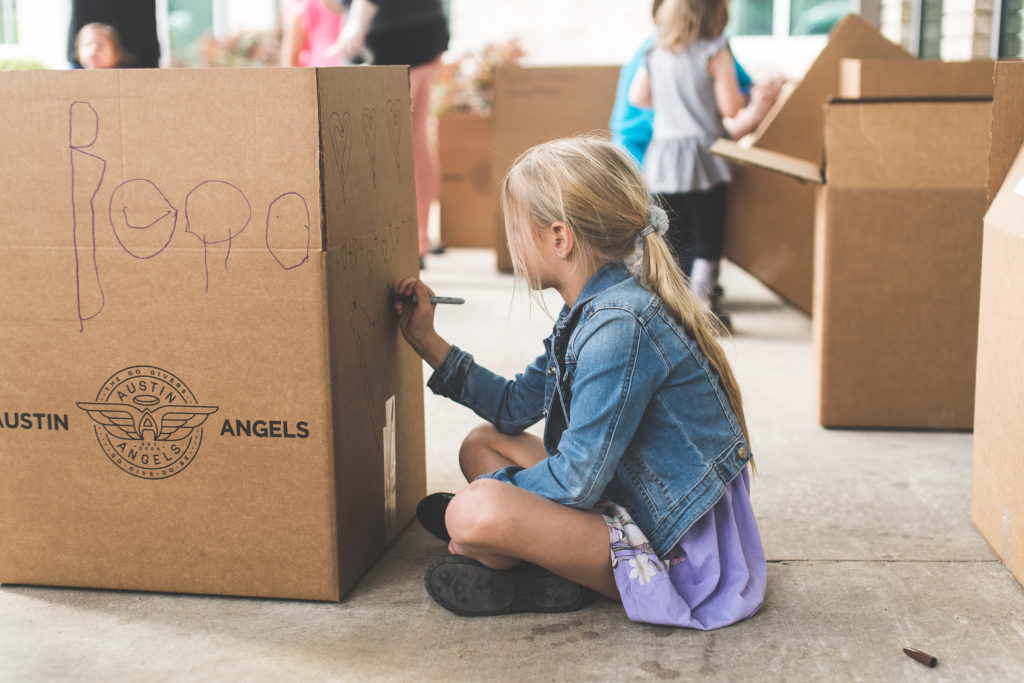
Carol was a loving and devoted foster mother to five children who were distant relatives, two of whom she had never met until they were placed in her care. She raised them on her own since they were toddlers and came to the decision to adopt them. In spite of her commitment, she quickly ran into obstacles.
Because the children were in Carol’s care as a kinship placement, she did not receive the same financial support an unrelated foster parent would. And the Texas Department of Family and Protective Services would not allow the adoption to take place because of the living conditions of Carol’s home. As a single mom, she had just enough money to break even every month, and if anything was left over, it went to the kids. Her home desperately needed some repairs or the children would most likely be removed and enter the foster-care system once again.
In stepped Austin Angels, a nonprofit that supports children in foster care and their caretakers through intentional giving, mentorship and relationship building. Its Love Box program matches foster families like Carol’s with volunteers who provide much-needed financial and emotional support. Five months after Carol was matched with a Love Box group, $26,000 was raised in support of her family, allowing for the purchase of a new manufactured home in the children’s school district. It was a gift that enabled Carol to adopt the kids so they could become a forever family.
“My Love Box group is like family. It feels as if they are fostering me,” Carol says. “They are an answered prayer. I prayed for a miracle, for an angel, and he sent me my angels, my Austin Angels.”
Susan Ramirez, CEO and founder of Austin Angels, says the gift allowed Carol to focus on what she does best: being a loving mother. It also meant she didn’t have to worry about her children being pulled from her because of the conditions of her home.
“There is a beautiful margin of people who are called to adopt, and a beautiful margin of people who are called to foster, but then there is this huge portion of people who see this big need but don’t know how they can be a part of the solution,” Ramirez says.
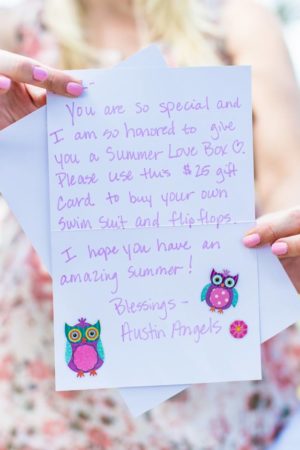 “So, we created a nonprofit that gives people the ability to walk alongside children in the foster-care system and truly change how they experience care. Every single day, we are actively fighting
“So, we created a nonprofit that gives people the ability to walk alongside children in the foster-care system and truly change how they experience care. Every single day, we are actively fighting
for the children in our community, as well as the 400,000-plus children nationally who are in the foster-care system.”
While not everyone is called to foster or adopt, Ramirez believes everyone can still make a vital difference in the lives of children in the system.
“Being a foster parent is such a hard job,” she says. “We have created a space where volunteers can come alongside these families, support them, lift them up and ultimately, make a difference in the lives of the sweet babies they care for.”
More than 40 percent of the foster families Austin Angels serves are headed by single mothers like Carol, and an even higher percentage of the group’s volunteers are women.
“It is a well-known fact that women are more philanthropic. They give more money and spend more time on charitable causes than men do,” Ramirez says.
Her organization’s two main goals are to strengthen families and help the children it serves develop a sense of identity. After having been separated from their families—sources of comfort and familiarity, regardless of whether they are actually safe— and moved from home to home, children usually aren’t able to form a clear identity and often feel as if they don’t really matter to anyone.
“These goals go hand in hand,” Ramirez says. “We believe that every child deserves to grow up to be great, and are passionate about giving our children the tools to do so. We strengthen the family by building community and by providing support so families know they’re not in the journey alone.”
This creates opportunities for these children to know their greatness.
“We are creating opportunities to erase the identities they’ve been labeled with,” she says, “and giving them the chance to be known instead as beloved, special, unique and worthy.”
Imagine Art
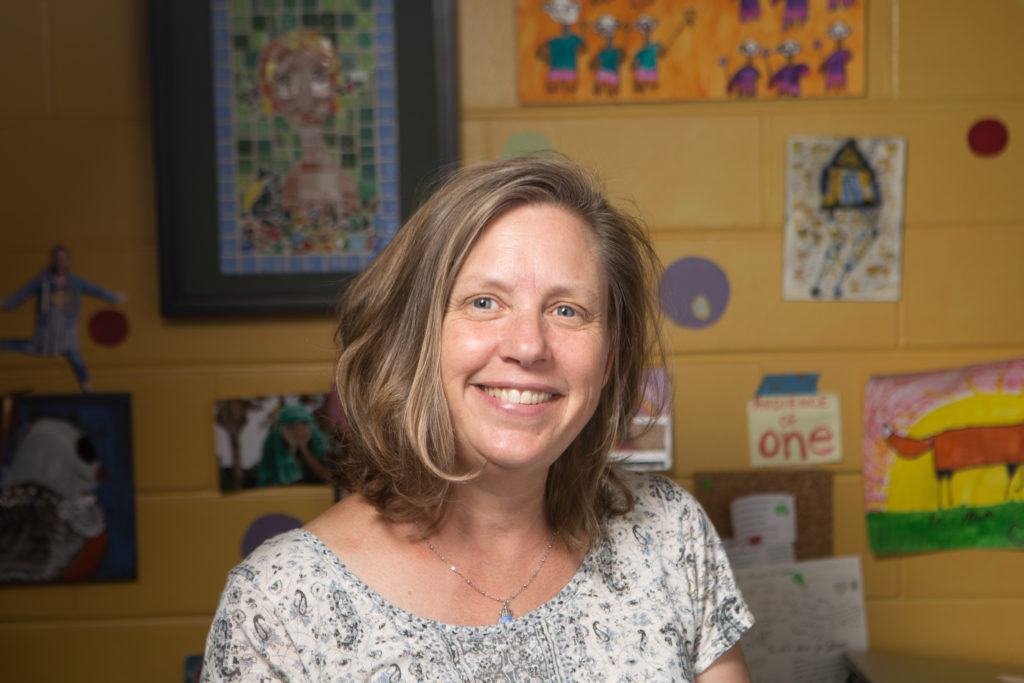
For Debbie Kizer, founder and executive director of Imagine Art, the organization’s offerings developed out of her personal experiences. Newly in recovery for drug addiction, Kizer was diagnosed with a mental illness in 1996. She had previously dabbled in the arts and went back to the arts to help on her journey to heal.
“Imagine Art’s formation came as a result of my exploring my own needs, desires, dreams and wishes,” Kizer says. “The nonprofit became a saving grace for me personally. It became my own community of authentic family. I consider myself to be a first fruit of the organization.”
Previously, Kizer worked in the disability community, serving as a consultant in the areas of developmental disability, employment and systems change. This background, along with her personal experience and passion for art, intersected in the creation of Imagine Art as a faith-based community for artists with and without disabilities. The organization offers an inclusive space where all artists thrive.
While Imagine Art’s programs are open to anyone, the group’s mission—and Kizer’s openhearted enthusiasm for artists with disabilities—puts a focus on providing additional support services to ensure those particular artists are successful. Artists with disabilities have access to the organization’s studio and professional art supplies free of charge, and also receive support from an artistic director and volunteer mentors. Non-disabled artists keep the space balanced and inclusive. They are given the opportunity and community resources to grow and transform as well, and can rent studio space, volunteer or become residents by bartering in exchange for free studio space.
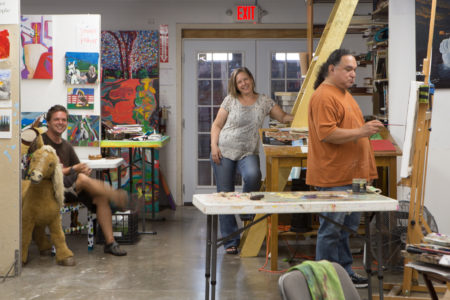 The Imagine Art studio is an open-model space. Here, artists work without walls. Throughout the gallery, displayed are
The Imagine Art studio is an open-model space. Here, artists work without walls. Throughout the gallery, displayed are
paintings, drawings, digital art, ceramics and fused glass. Daily life at the studio is “controlled chaos,” with people coming in and out, making art, gardening, eating meals together and showing off their talents on the gallery walls.
“Over 21 years, the Imagine Art community has grown to be a strong and diverse group of artists, both with and without disabilities,” Kizer says. “And together, they are making a significant impact in and beyond the arts.”
The organization has grown organically, evolving to provide services that meet needs as they arise. For example, hunger was an issue among those it serves, so Imagine Art began providing free hot lunches for as many as 30 artists each day. Members’ needs for transportation, residential support and specialized services such as counseling and nursing led to contracts with Medicaid, Medicare, and Health and Human Services, which offer long-term care.
“The provision of long-term care has been an unexpected service of the organization, and I am finding it to be vital to
both the community and to the maturity of the nonprofit,” Kizer says. “We are employing transformed artists with and without disabilities to be caregivers for long-term care services. Our services are progressive and innovative because they are driven by people who have been transformed by the work of Imagine Art.”
Affordable housing is the next pressing need, and Imagine Art is now positioning itself for the development of a 5-acre live-and-make campus in East Austin. “Bridging the arts, ministry, long-term care and affordable
housing in such a way that is innovative and progressive, inclusive and creative is a vital aspect to the work that Imagine Art is undertaking,” Kizer says. “The organization is pioneering and cutting a path to demonstrate change that will impact long-term care systems, art-space development, economic development for hard-to-employ people and affordable housing.”
Working With Imagine Art
Ceramist Traci Ward joined Imagine Art as a non-disabled artist in 2016 to volunteer in the ceramics studio. Her natural skills in marketing and public relations led her to develop workshops for the organization, and she is currently working to launch a ceramics series using Imagine Art’s studio space as a launch pad.
Ward’s line of artistic pottery and statement jewelry can be found at the Blanton Museum of Art and in many stores throughout Austin, as well as at her Little Clay Studio.
“Imagine Art embodies the spirit of creativity and community in its daily functions,” Ward says. “As a volunteer, you naturally help when a need aligns with your skill. As an artist, your craft grows within the freedom to explore
the spacious studio, and as a member, you’re embraced as a part of the Imagine Art family. Imagine Art is an Austin gem for local artists and art enthusiasts.”


